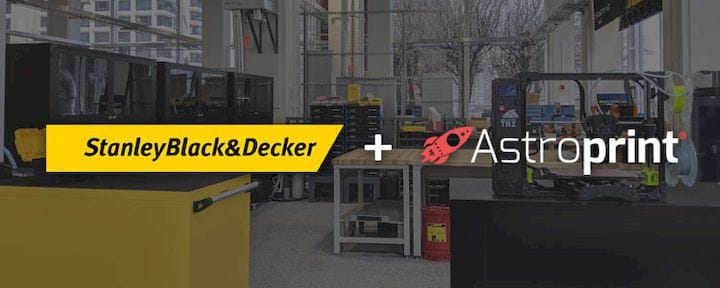![AstroPrint will be used extensively at Stanley Black & Decker [Source: AstroPrint]](https://fabbaloo.com/wp-content/uploads/2020/05/image-asset_img_5eb09b141991a.jpg)
AstroPrint announced a spectacular arrangement with Stanley Black & Decker.
AstroPrint is a popular cloud–based solution for managing groups of 3D printers. We first wrote about them in 2014, five years ago. Since then the company has been gradually enhancing its offering, from releasing their own standalone control unit, to introducing their own mobile app.
Their system works by leveraging the inevitably unused USB port on most desktop 3D printers by connecting it through a set-top box to their extensive cloud network. Once the machine is instrumented in this way many things become possible, such as remote control of the device, webcam monitoring in real-time, reprinting previous 3D models from cloud storage, and much more.
AstroPrint also includes capabilities for managing more than one device within a business.
By attaching their set top box to a 3D printer, it does more than merely adding a color touchscreen interface to the device, as it brings forward all the power of the cloud right to the 3D printer.
AstroPrint monetizes their platform in a couple of different ways. First, they offer what they call a “basic plan”, available at no charge. The basic plan allows up to two 3D printers connected per account and has some limits on cloud storage and services. It’s ideal for personal use, and also for testing by businesses if they’re curious about AstroPrint.
Their professional plan, US$10/mo, allows five printers, but the possibility of adding an unlimited quantity of additional 3D printers at US$5/mo each. For those businesses with a moderate amount of 3D printers, this might be an ideal plan.
For larger businesses with huge quantities of 3D printers, the US$5/mo fee per printer might be a bit much. For this scenario AstroPrint offers negotiable “Business and Enterprise Plans”. We don’t know the pricing at this level because, duh, it’s always negotiable.
It seems that AstroPrint has made a sale of this offering to Stanley Black & Decker, one of the world’s largest manufacturers of industrial tools and household hardware products. To give you an idea of their size, Stanley Black & Decker’s revenue in 2017 was almost US$13B! They employ nearly 60,000 staff, and produce thousands of products with brand names like DeWalt, Craftsman, Bostitch, Mac tools, and many more.
The press release from AstroPrint doesn’t really indicate how many 3D printers would be connected to the AstroPrint network, but you can bet it is a rather large number. This is a company that designs and makes tens of thousands of products; they will no doubt employ 3D printers all over to optimize their design and prototyping activities.
The implementation at Stanley Black & Decker will allow them to not only increase the effectiveness of the individual 3D printers connected to the network, but also allow their managers to finally have visibility over the entire fleet of 3D printers at the company.
The AstroPrint instrumentation will provide data on print failures and successes, usage rates, materials and much more. This could allow the managers to identify machine types that are less than optimal for example, thus triggering replacement with better equipment. It could also identify machines that are lightly used, and could suggest to managers better locations where demand is higher.
I’ve seen similar scenarios unfold in the past on old-time 2D printers, spread across a large enterprise. I cannot tell you the amazing benefits one can obtain by simply being able to know what the heck is going on with all those devices. I suspect Stanley Black & Decker will have the same experience.
For AstroPrint this is a monstrous deal, as it is not only large and providing additional revenue to the company, but it will also serve as a concrete example of the actual use of AstroPrint in a large enterprise. AstroPrint will be able to leverage this experience on other prospects who might be a little conservative, waiting for someone else to give it a try first.
Expect more deals like this from AstroPrint.
Via AstroPrint











A blog post reveals much of what happens behind the scenes at 3D print service Shapeways.